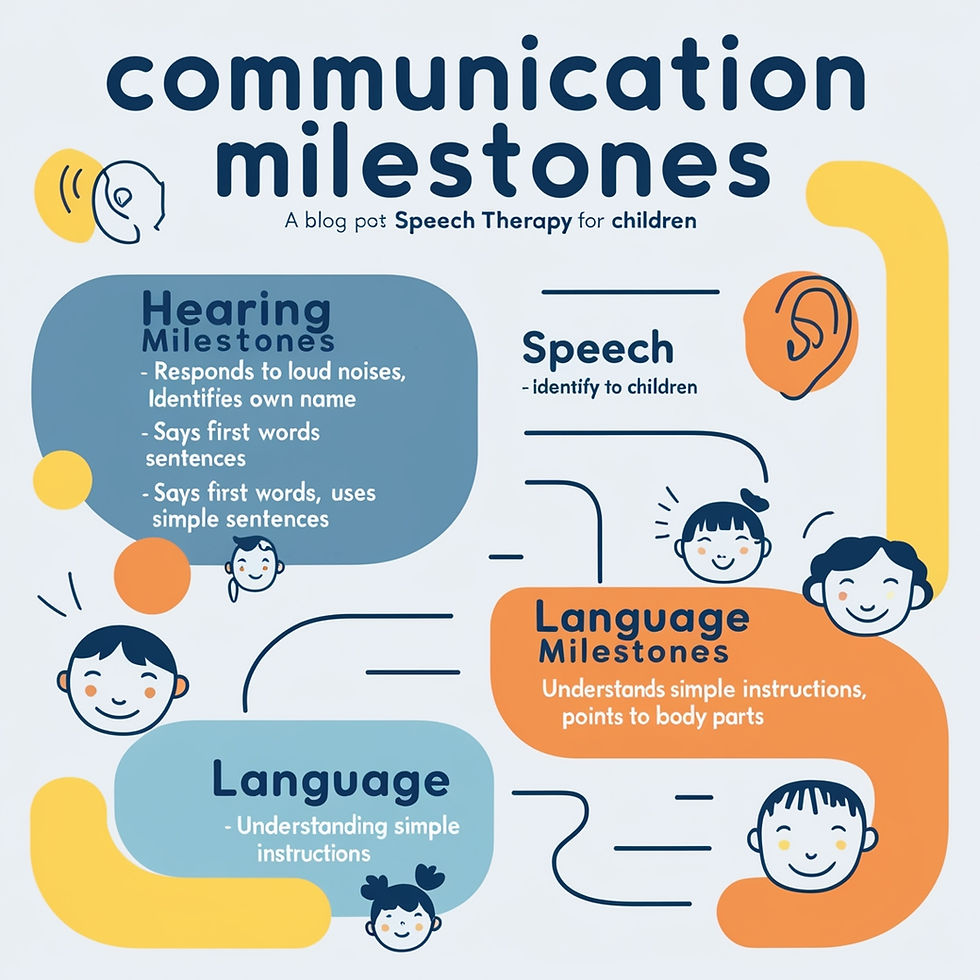Early Childhood Milestones: A Parent’s Guide to Supporting Speech and Learning
- mrsphomm
- Jan 20, 2025
- 4 min read
Unlocking Your Child’s Potential: Understanding Developmental Milestones to Age 3
As a parent, nothing is more exciting than watching your little one grow and develop new skills. But in small towns like Macclenny, FL, and surrounding rural communities, finding quality speech therapy and resources can be challenging. From their first coo to their first steps, every milestone is a celebration. But what happens when those milestones seem delayed? For parents in Macclenny, FL, navigating the developmental journey can feel overwhelming—especially if your child has a speech disorder or learning disability. Understanding the key developmental milestones can help you take proactive steps toward your child’s success.
Why Developmental Milestones Matter
Developmental milestones provide a general roadmap of what most children can do by a certain age. They encompass physical, emotional, cognitive, and communication skills. While every child develops at their own pace, significant delays in achieving these milestones could signal an underlying issue that may require intervention. Early detection and support can make all the difference in a child’s long-term growth.

Birth to 1 year
Birth to 3 Months
What to Expect:
Hearing and Sound Response: Alerts to sounds, quiets or smiles when spoken to, and may coo or gurgle.
Emotional Interaction: Responds to your voice with smiles or calming behavior.
Vocal Development: Makes cooing sounds like “ooo” or “aah” and communicates through cries and small vocalizations.
How You Can Help:
Talk to your baby often and make eye contact during feedings.
Imitate their coos and respond with exaggerated facial expressions to encourage interaction.
4 to 6 Months
What to Expect:
Social Engagement: Giggles, laughs, and responds to your facial expressions.
Sensory Development: Reacts to toys that make noise and follows moving objects with their eyes.
Vocal Play: Produces a variety of vowel sounds and begins combining vowels with consonants, such as “da” or “ga.”
How You Can Help:
Use toys with sounds, such as rattles or musical instruments, to encourage auditory exploration.
Sing songs and exaggerate sounds like “ba-ba-ba” or “ma-ma-ma” to model speech patterns.

7 to 9 Months
What to Expect:
Recognition Skills: Responds to their name and familiar voices.
Social Cues: Raises arms to be picked up and looks at you when you call their name.
Babbling: Produces long strings of sounds such as “babababa” and “mamamama.”
How You Can Help:
Play interactive games like peek-a-boo or pat-a-cake to encourage social interaction.
Label objects and people in your baby’s environment to help build their vocabulary.
10 to 12 Months
What to Expect:
Communication Gestures: Points, waves, or shows objects to initiate communication.
Imitation: Tries to mimic sounds and actions, such as clapping or blowing kisses.
Early Words: Begins saying simple words like “mama,” “dada,” or “hi.”
How You Can Help:
Narrate daily activities, such as “We’re getting ready for bath time!”
Encourage gestures by modeling actions like waving goodbye or pointing to objects of interest.
1 to 3 Years
As your child grows into toddlerhood, their communication skills will expand rapidly. By age 3, they should be able to:
Combine two or more words into phrases.
Follow simple directions, like “Pick up your toy.”
Ask questions and name familiar objects.
If your child has difficulty meeting these milestones, it’s important to seek support. Speech-language pathologists (SLPs) can provide tailored strategies to address your child’s needs.
When to Seek Help
While variations in development are normal, you should consult a professional if your child:
Does not respond to sounds or voices by 6 months.
Has not started babbling by 9 months.
Does not say any words by 12 months.
Shows no interest in imitating gestures or sounds.
The American Speech-Language-Hearing Association (ASHA) offers a tool called ProFind to locate certified audiologists and SLPs near you.

Practical Tips for Supporting Your Child
Create a Language-Rich Environment: Narrate everyday activities and encourage your child to participate in conversations.
Engage in Interactive Play: Use games and songs that promote turn-taking and imitation.
Read Daily: Choose books with bright pictures and simple text to foster language comprehension.
Monitor Hearing Health: Watch for signs of hearing issues, such as ear-pulling or frequent infections, and consult a doctor if needed.
At Heart Speak Therapy, we specialize in helping children in Macclenny, FL and surrounding areas, reach their full potential. Whether you’re concerned about a speech delay or just want to ensure your child is on track, our Clinically Certified Speech Language Pathologist is here to help. Schedule a consultation today to get started on the path to success.
FAQs
1. What if my child isn’t meeting milestones on time?It’s important to remember that all children develop at their own pace. However, if you notice significant delays, consult a pediatrician or speech-language pathologist to evaluate your child’s needs.
2. Can I help my child at home, or do I need professional intervention?Parents play a crucial role in supporting their child’s development. Engaging in interactive play, talking to your child, and reading together are great ways to encourage growth. For persistent concerns, professional intervention is recommended.
3. How can I find a speech-language pathologist in Macclenny, FL? Visit the ASHA website and use their ProFind tool to locate certified professionals in your area. Alternatively, ask your child’s pediatrician for a referral. Contact us at 904-513-1382
.png)





Comments